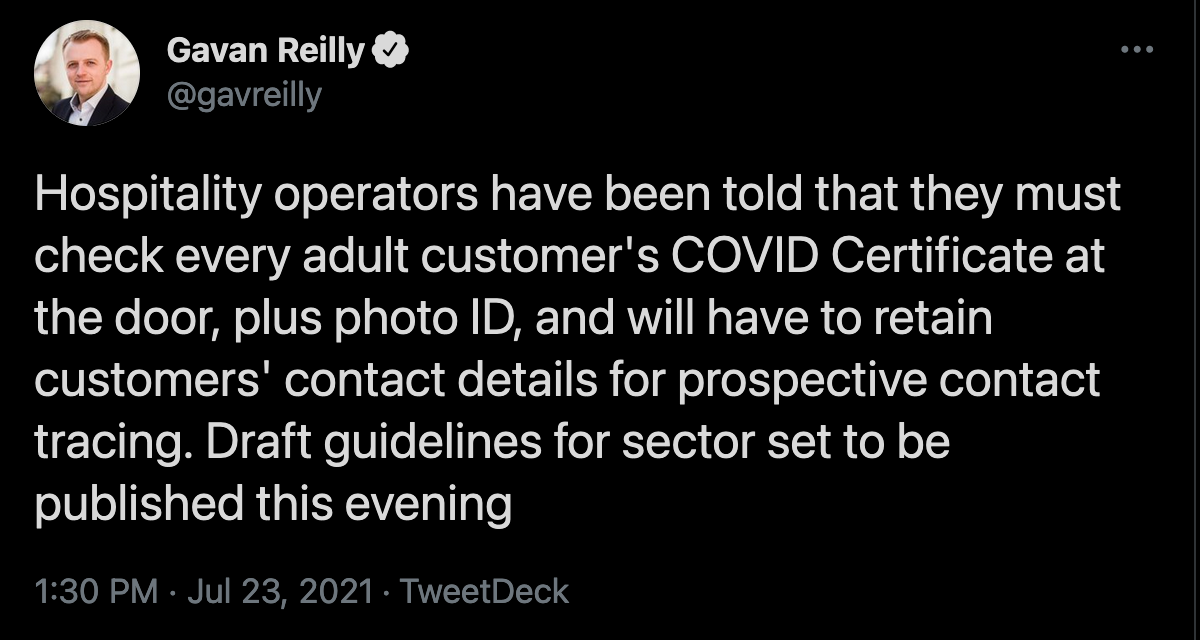The Gist: Grabbing a Quick Byte / The Once and Future PDs
The sun shone as the government struggled to meet their promise to let customers go indoors for dinner and a drink. And we look at Dessie O'Malley's underconsidered legacy. This is the Gist.

Pints Policy
The question of getting people into pubs again has taken on totemic importance as the pandemic has ground on. Hospitality, as an industry, has never been shy about making its political voice heard. So, when, at the end of June, the Government postponed reopening, it was the main headline consequence of the changing infection patterns triggered by the Delta varient of Covid19.
The Government later announced it would allow the opening to proceed from next Monday, the 26th July. Unfortunately, this decision seems to have been arrived at first and only then did the preperation to allow it to happen begin.
As a result, as the deadline loomed, all week we’ve had a daily adjustment of the announced rules governing people’s entry to the hallowed ground of ‘inside’, each decree adding another layer of complexity and administration to stepping over the threshold.
By lunchtime Friday, with the app to allow the scanning of QR Covid Certificate codes still not released, this was what was being promulgated;

The problem for the government (as data controllers in this instance) is that they’re mandating a form of data processing which Article 35.3 of the GDPR says can only happen lawfully if there is a Data Protection Impact Assessment completed before the first bit of data is collected or otherwise processed. Maybe there’s a lovingly crafted DPIA completed in a government drawer somewhere. If so, it might be a good idea to follow the HSE’s example with the Covid tracing app and publish it.
On the other hand, the evolution of this plan, buffeted by industry negotiations and institutional impulses from the state is giving off very strong ‘Didn’t do a DPIA’ vibes. Certainly elements (every adult member of a household having their contacts individually taken, for example) look like they wouldn’t have survived a systematic assessment for necessity and proportionality.
None of which is to say that rules distinguishing between vaccinated and unvaccinated people, proportionate to an ongoing health crisis, are illegitimate per se.
But intervening in the lives of citizens should be done lawfully, both because to do otherwise is to invite mayhem but also because the DPIA system is designed to produce a better policy outcome. That’s why it was made compulsory. It gives structure to the difficult and sometimes chaotic world of policy formation- whether that’s inside a company or at the level of a national government.
Dull though it may seem to the more buccaneering impulses of politicians, a good and lawful process is one of the best ways to end up with a lasting, solidly defensible effective outcome.
Skipping it because you want to move faster to get to your pre-determined end seems like the classic ‘More Haste, Less Speed’ error.
Dessie Did It
During the week, Des O’Malley, a politician who had a three-act impact on Irish society over decades, died. The obituaries tended to acknowledge his Act I role as Minister for Justice during the Troubles in the 1960s, before dwelling on his Act II role as Charlie Haughey’s antagonist. This is understandable, as both supply personal drama and revealed O’Malley’s character- a critical part of an obituary.
But it left his most lasting impact on Irish politics playing as afterthought. Des O’Malley was the founder of the Progressive Democrats, the most influential defunct party in the history of Irish politics. The PDs were the model for the ending of the Civil War split by identifying a set of policies- economically right wing, but uninterested in the restrictions of the Catholic Church on personal freedom- that a large bloc of the supporters of FF and FG felt good about.
For much of his time as party leader, the PDs were in power. Indeed, that power lasted long after the initial surge of electoral support had ebbed, as they remained in Government as ideologically influential coalition party members.
But their power also came from speaking for the interests of a class (rich people) who themselves wield power in society and could amplify their ideas, turning them into assertions of political common sense.
Whether it is the Táiniste’s constant talk about cutting taxes on highly paid people, or media demands to hurry up and reintroduce austerity to shrink the supports for those left out of work by the pandemic, or the growing unelectablility of mainstream party candidates who reject a secular state, the Progressive Democrat voice is still echoing past its official lifespan.
And, as the founder of a party built on FF politicians being elected by FG supporters, the current FF/FG coalition government shows that Des O’Malley’s political third act was the one with the most profound long term results.
Ejected from Fianna Fáil for ‘conduct unbecoming’ he ended up becoming the model for modern Irish right-wing politics.
Coda:
Many thanks to all of your for subscribing. Feel free to forward this email on to friends or enemies you think might also enjoy it. And, if you’re a paying subscriber, I’ve introduced a very small change- you can now leave comments under the web versions of these pieces. If you do, be sure to be excellent to each other.




